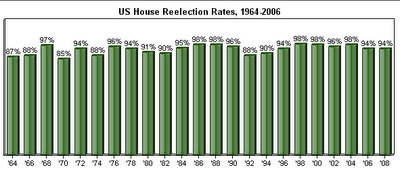It was another banner election year for term limits.
Across the nation on Nov. 2, voters approved new term limits or defended or strengthened existing ones at the state and local level. Plus, about a dozen signers of the
U.S. Term Limits Amendment Pledge won their Congressional races and will be pushing for term limits in the new Congress.
By signing the
U.S. Term Limits Amendment Pledge, Congress members committed to "cosponsor and vote for" Congressional term limits along the lines of Sen. Jim
DeMint's existing term limits amendment bill.
DeMint's bill calls for limits of three terms (six years) for the House and two (12 years) for the Senate.
Signers who won include Dave
Schweikert (AZ-5), David Rivera (FL-25), Michael
Pompeo (KS-4), John Sullivan (OK-1), Frank Lucas (OK-3), Tom
Coburn (OK-SEN), Tim Scott (SC-1), Jeff Duncan (SC-3), Mick
Mulvaney (SC-5) and Ralph Hall (TX-4). Two races involving term limits
pledgers have not been decided as of this writing, Joe Walsh (IL-8) and Rocky
Raczkowski (MI-9).
Of all the 2010 term limits
referenda I know about, term limits won 34 out of 35 jurisdictions. (If any
referenda escaped my notice, please let me know.) Interestingly, this is a
similar result as 2008, an election in which Democrats were ascendant.
2010 TERM LIMITS REFERENDA RESULTSDOWNER'S GROVE, IL -- Referendum to limit mayor to two 4-year terms and commissioners to three (advisory only)
YES 84% -- TERM LIMITS WIN!
NO 16%
BOULDER CITY, NV -- Limits city council members to three terms in office
YES 71% -- TERM LIMITS WIN!
NO 29%
BOULDER CITY, NV -- Limits appointees of city
committees to three terms
YES 60% -- TERM LIMITS WIN!
NO 40%
CAPE
CANAVERAL, FL -- Limits terms of mayor and council members to two consecutive 4-year terms
YES 69.5% -- TERM LIMITS WIN!
NO 30.50%
CHAFFEE COUNTY, CO -- Would eliminate the term limit on the district attorney
YES 41%
NO 59% -- TERM LIMITS WIN!
CLINTON COUNTY, VT -- Would abolish term limits for Clinton County legislators
YES 28.46%
NO 71.54% -- TERM LIMITS WIN!
CORPUS CHRISTI, TX -- Increases waiting time from two to six years for politicians termed out of office to run again for the same seat
YES 63% -- TERM LIMITS WIN!
NO 37%
EAGLE COUNTY, CO -- Weakens term limits from two to three 4-year terms
YES 31%
NO 69% -- TERM LIMITS WIN!
EL PASO COUNTY, CO -- Weakens term limits from two to three 4-year terms
YES 60%
NO 40% -- TERM LIMITS LOSEFARRAGUT, TN -- Limits official to two terms in a single office, three in any office
YES 91.5% -- TERM LIMITS WIN!
NO 8.5%
FULLERTON, CA -- Limits council members to three 4-year terms
YES 79.8% -- TERM LIMITS WIN!
NO 20.2%
HEMET, CA -- No elected official can serve more than three 4-year terms in their life
YES 89% -- TERM LIMITS WIN!
NO 11%
INDIAN WELLS, CA -- Limits mayor and council to two consecutive 4-year terms
YES 79.25% -- TERM LIMITS WIN!
NO 20.75%
KIT CARSON COUNTY, CO -- Abolishes term limit on district attorney
YES 29%
NO 71% -- TERM LIMITS WIN!
LAGUNA HILLS, CA -- Limits city council members to two 4-year terms
YES 74.4% -- TERM LIMITS WIN!
NO 25.6%
LOGAN COUNTY, CO -- Eliminates term limit on district attorney
YES 30%
NO 70% -- TERM LIMITS WIN!
LOOMIS, CA -- Limits town council members to two consecutive 4-year terms
YES 55.4% -- TERM LIMITS WIN
NO 44.6%
MENIFEE, CA -- Limits council members to two consecutive 4-year terms
YES 81.7% -- TERM LIMITS WIN!
NO 18.3%
MORGAN COUNTY, CO -- Eliminates term limit on district attorney
YES 26%
NO 74% -- TERM LIMITS WIN!
MULTNOMAH COUNTY, OR -- Abolishes county term limit of two 4-year terms in any 12-year period
YES 49%
NO 51% -- TERM LIMITS WIN!
MURIETTA, CA -- Limits council members to two consecutive 4-year terms
YES 67% -- TERM LIMITS WIN!
NO 33%
NAPERVILLE, IL -- Limits mayor and council members to three consecutive 4-year terms
YES 72% -- TERM LIMITS WIN!
NO 28%
NEW MEXICO (STATEWIDE)
Would permit county commissioners to serve three consecutive terms instead of two
YES 17.5%
NO 82.5% -- TERM LIMITS WIN!
NEW YORK CITY, NY -- Reestablishes term limits on mayor and council members of two consecutive 4-year terms
YES 74% -- TERM LIMITS WIN!
NO 26%
OKLAHOMA (STATEWIDE) -- Sets lifetime term limit for governor and other statewide officials to two 4-year terms
YES 69.88% -- TERM LIMITS WIN!
NO 30.12%
PARK COUNTY, CO -- Would eliminate the term limit on the district attorney
YES 31%
NO 69% -- TERM LIMITS WIN!
PHILLIPS COUNTY, CO -- Eliminates term limit on district attorney
YES 34%
NO 66% -- TERM LIMITS WIN!
ROSEVILLE, CA -- Would weaken council term limits to three from two 4-year terms
YES 31%
NO 69% -- TERM LIMITS WIN!
SAN DIEGO, CA -- Limits terms of county supervisors to two 4-year terms (on primary ballot June 2010)
YES 69% -- TERM LIMITS WIN!
NO 31%
SANTA CLARA, CA -- Limits water district members to three terms
YES 75.37% -- TERM LIMITS WIN!
NO 24.63%
SEDGWICK COUNTY, CO -- Eliminates term limit on district attorney
YES 39%
NO 61% -- TERM LIMITS WIN!
STOW, OH -- Limits city council to two 4-year terms
YES 75% -- TERM LIMITS WIN!
NO 25%
STOW, OH -- Limits city finance director to two 4-year terms
YES 73% -- TERM LIMITS WIN!
NO 27%
WASHINGTON COUNTY, CO -- Eliminates term limit on district attorney
YES 32%
NO 68% -- TERM LIMITS WIN!
YUMA COUNTY, CO -- Abolishes existing term limit on district attorney
YES 35%
NO 65% -- TERM LIMITS WIN!























